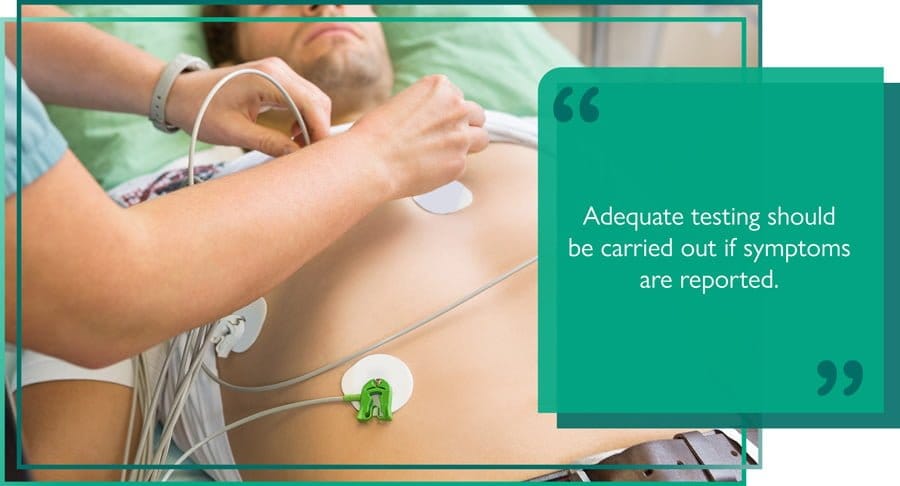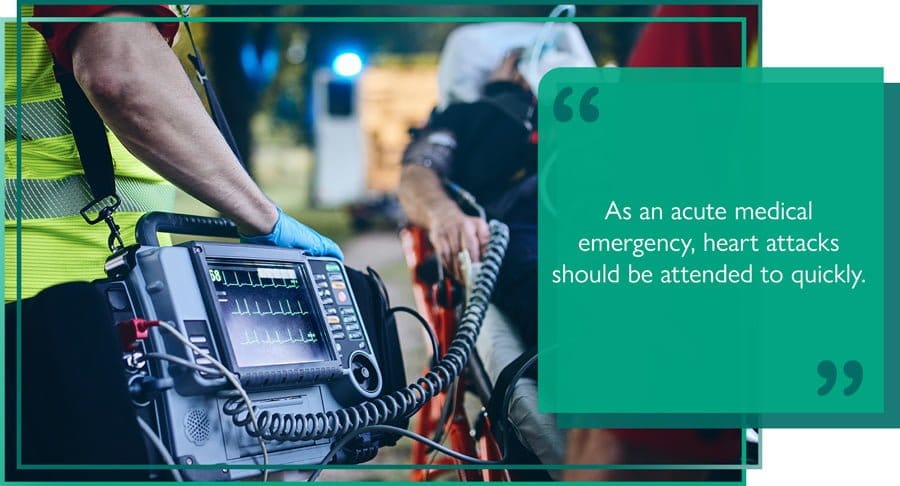Unfortunately, misdiagnosis or poor care may negatively affect how a patient recovers from a heart attack. If they or their family believe poor treatment resulted in a poor outcome, they may have grounds to raise a medical negligence claim after a heart attack occurs.

Common causes of a heart attack
The most common heart and circulatory disease in the UK is coronary heart disease (CHD). As the leading cause of death, and most common cause of premature death in the UK, it can often lead to a heart attack.
Arteries become blocked by fatty substances which restrict blood supply to the heart. As the muscle is deprived of oxygen, heart muscle can become damaged, diseased, or even die.
If identified by its main symptoms, such as recurring low-level chest pain (angina) or shortness of breath, CHD can be managed with medication and lifestyle changes. Some people will experience no symptoms before receiving a diagnosis.
Reasons to claim for a heart attack
Despite owing a duty of care to all patients, human error or systemic issues may lead to negligent care. Failing to prevent an avoidable heart attack or provide timely, effective treatment during a heart attack can be reason to claim.
Misdiagnosis or late diagnosis
Misdiagnosis can occur if less severe symptoms, such as indigestion or acid reflux, are misinterpreted when not accompanied by more obvious symptoms. Understanding how and where symptoms may manifest, in both men and women, helps avoid misdiagnosis.
When diagnosing a patient, medical staff should:
- assess symptoms
- question and listen to the patient
- query medical and family history
- consider other determining factors, such as lifestyle, to ensure accuracy
Failing to carry out adequate testing or exploration could amount to medical negligence. If a patient endures pain, suffering, and lasting damage as a result, they could be entitled to claim compensation for heart attack misdiagnosis.

Heart attacks in children or teenagers
Heart attacks are not typically associated with young, or seemingly healthy people. Unfortunately, due to the increased likelihood of cases to occur among older individuals, late diagnosis can be more likely in children or teenagers.
Poor care standards
If a heart attack or common causes of heart attack are suspected, appropriate testing such as an ECG scan, blood samples, or a coronary angiography (an x-ray of the heart’s arteries) should be utilised.
If warning signs or comorbidities exist, a GP or other medical professional should provide lifestyle advice or medication. Failure to provide these could constitute a breach in the duty of care.
Negligence may have occurred if:
- Symptoms are misdiagnosed or overlooked
- Diagnostic tests are not performed, or performed incorrectly
- Test results are misinterpreted
- Patients are not referred to specialist hospitals or wards.
Slow emergency response
As an acute medical emergency, heart attacks should be attended to as quickly as possible. Ambulance delays may worsen the patient’s condition, potentially causing lasting damage to the heart, or even avoidable death in the most serious cases.
Should an ambulance arrive, but the paramedics or ambulance staff fail to provide adequate care or treatment, this may also be a cause for a claim.

Heart attack compensation
Compensation may be awarded if it can be proven someone suffered avoidable pain or worsening of their condition due to medical negligence. Inadequate management of complications or poor care that leads to delayed recovery may also be considered.
Damages are awarded depending on the severity of pain and suffering experienced, and how much this impacted physical, mental, or emotional health.
Life-changing consequences, such as brain damage or loss of mobility, may increase the compensation award.
Additional damages may be awarded for loss of earnings and travel expenses. Should lasting damage change how a patient lives, damages may be awarded for loss of future earnings or necessary adaptations to their home or vehicle.
How to claim for a heart attack
Should medical negligence be proven to have contributed to avoidable pain and suffering, or long-lasting damage to someone’s mental or physical wellbeing, they could be entitled to compensation.
However, the process of bringing a claim can be complex. Turning to a professional for assistance with building a case and making a claim will ensure you stand the best chance of success.
At Devonshires Claims, our team of experienced clinical negligence solicitors can guide you through the steps of gathering evidence, advise you on your chances of making a successful claim, and represent you in the claims process, on a ‘no-win, no-fee’ basis.
Begin a free case evaluation today by getting in touch with the team at Devonshires Claims. Call 0333 016 5180, email [email protected], or use our online contact form.


